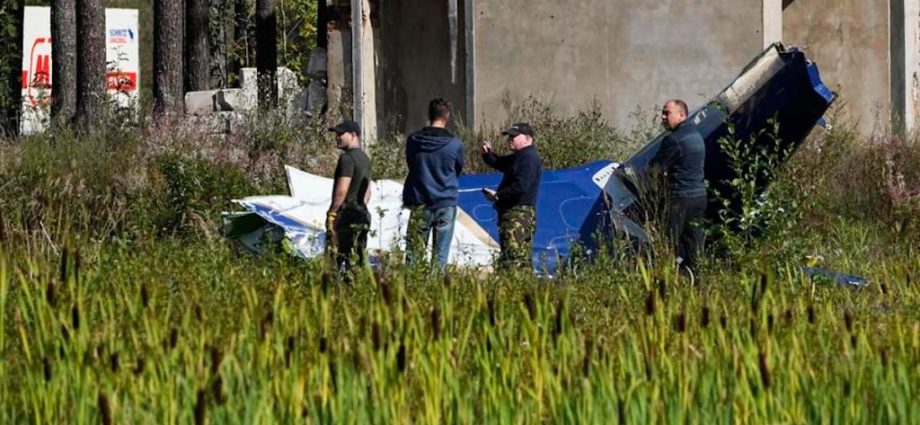I believe Yevgeny Prigozhin, leader of Russia’s Wagner group mercenary army, died in the wreckage of one of his private planes on August 23. (Some early news reports noted speculation Prigozhin might not have been aboard.)
I also strongly suspect that the plane was shot down, not felled by a bomb smuggled on board or by mechanical accident. But whether a bomb or a missile, I have no doubt it was a deliberate assasination and not a mechanical failure of some kind that brought down the Embraer.
I believe Russia’s military intelligence agency, the GRU, had the means and motive to act with or without Putin’s prior endorsement.
I doubt Russian President Vladimir Putin ordered the spectacular assassination of his ally-turned-challenger. The key reason for that is Putin cut a deal with Prigozhin and his ally in Belarus, Lukashenko. That deal protected Prigozhin. While Prigozhin no doubt violated the terms of the deal, I don’t think Putin would have taken such a drastic step mostly because of his long friendship with Prigozhin and because of his promises.
As I said while speaking to a Jewish Policy Center webinar August 24 (see the box on the right; you can listen), images of the private jet’s wreckage seemed to show shrapnel holes in the remains of one wing. You wouldn’t get shrapnel from an explosion on the plane. You would get it from anti-aircraft missiles.
The CIA since my presentation has said that it was a bomb, not a missile, probably basing this on what satellites are showing. But picking up an air defense missile isn’t that easy.

The plane was flying at 28,000 feet and still climbing. Only certain ground-to-air missiles like those of the Russian BUK system – not to mention fighter aircraft – would have been able to blast it out of the sky 100 miles northwest of Moscow. The regular Russian military possesses air defense systems in the region of the crash. The GRU has them too.
My speculation is that the GRU – the Main Directorate of the General Staff of the Armed Forces of the Russian Federation – wanted to take back control from Wagner. The mercenary group, active on the Kremlin’s behalf in Africa and Syria, took the lead from the regular army in the nine-month battle for Bakhmut in eastern Ukraine. While Wagner lost many from its reported peak total of 50,000 troops, it eventually drove back a larger Ukrainian force.
Prigozhin and Wagner embarrassed and undermined the regular military, and Putin, with a short-lived mutiny and abortive march on Moscow in June. In the aftermath, in exchange for giving Prigozhin and Wagner the choice of merging into the army or deploying to Belarus, Putin had promised to protect Prigozhin.
The two had grown up in the same Leningrad (now again St Petersburg) neighborhood. The pair previously cooperated and Prighozin, once imprisoned for years as a thief, used a catering empire as a platform for a private army useful to Putin.
Former US President Bill Clinton observed that Putin keeps his promises. If he promised to protect Prigozhin, he probably tried to.
At the time of the plane crash, Putin had been in Kursk, celebrating the 80th anniversary of the Soviet Union’s World War II victory over Nazi Germany in a battle there. He was hustled back to Moscow and beyond that the following day he offered his condolences to the victims of the crash. The Kremlin has strongly denied it was involved in the plane crash.
The GRU is much more powerful than the FSB – the Federal Security Service, successor to the KGB intelligence/secret police. It’s not like the US Defense Intelligence Agency, which is primarily analytical. GRU is analytical and operational. Its special forces are big.
The elimination of Prigozhin along with his number two, Dmitry Utkin, a former Russian army officer and Wagner’s actual founding leader, helps restore Putin’s image, which was tarnished by the mercenaries’ rebellion. But if it’s true that it was not he who ordered this, he has to watch his back.

Update
Here’s the latest on Putin from the Washington Post, under a headline that says, in part, “Putin pays tribute to Prigozhin”:
Russian President Vladimir Putin praised Yevgeniy Prigozhin, the chief of the Wagner mercenary group, in his first remarks since the crash of a plane whose passenger list included Prigozhin’s name. Putin said in televised comments that Prigozhin was a “talented man” who “made serious mistakes.” However, he stopped short of explicitly confirming Prigozhin’s death, saying that a “preliminary investigation” of the crash, including forensic analysis of the bodies, was underway.
Bottom line: I still think it was a missile. Everyone agrees it was an assassination. I am standing by my argument that it was NOT Putin.
Meanwhile …
Meanwhile, the war against Ukraine may be tilting in Russia’s favor. The Russian army has trained 250,000 to 350,000 reserves. It now has approximately 100,000 troops in Ukraine and, with Kyiv’s anticipated spring-summer offensive apparently failed, I don’t think Moscow needs Wagner mercenaries there.
The fighting has cost Ukraine huge amounts of troops and equipment including Western equipment. I think the war is getting more and more difficult for Ukraine. The longer it takes to negotiate a settlement, the more territory Russia will take. I believe talks will happen soon.
Tension between Poland and Belarus may be reduced with Wagner troops apparently out of Belarus. Polish forces are much better than Belarus’s troops. In addition, the Poles have their own ambitions, let’s be honest. If for some reason the Ukrainian government collapses, I wouldn’t be surprised to see Poland take the Lviv region from Ukraine – and the Russians not do much about it.
Stephen Bryen is a senior fellow at the Center for Security Policy and the Yorktown Institute. A version of this article was originally published on Weapons and Strategy, his Substack. Asia Times is republishing the article with permission.

